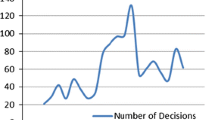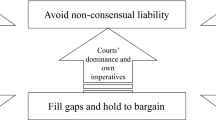Abstract
This essay recounts a fascinating if complicated piece of Anglo-American debate. My aim is to reach a conclusion about the importance of the notion of changing one's normative position as part of the act of “giving sufficient consideration” for a legal contract. In several journals and textbooks between 1894 and 1918 the major contract scholars of the time, e.g., Langdell, Anson, Pollock, Williston, Ames, and Corbin, discussed a special example which was thought to reveal a paradox in the common law of consideration. The problem had shown itself in the textbooks of Pollock in England and Langdell in the United States. The example is of two contracts made by three persons in which one contract with the third party repeats the content of an existing contract with the second party. It would appear that the party at the pivot experiences no new detriment in merely performing, or promising to perform, his pre-existing duty. If so, such oblique contracts with third parties must fail for want of consideration extended from the first party. About this difficulty the experts were anything but agreed. The cases were not consistent. At the root of this uncertainty is an ambivalence about the concept of consideration itself. Should it be conceived in terms of normative relations and changes of moral position or should it be conceived in valuative terms, as harms and benefits? The differences of opinion about the legal validity of oblique contracts is explained by this ambiguity, one which the common lawyer has not yet resolved.
Similar content being viewed by others
Author information
Authors and Affiliations
Additional information
This paper was written while holding a Social Science and Humanities Research Council of Canada Leave Fellowship, for which I express my gratitude.
Rights and permissions
About this article
Cite this article
Bronaugh, R. A secret paradox of the common law. Law Philos 2, 193–232 (1983). https://doi.org/10.1007/BF00144448
Issue Date:
DOI: https://doi.org/10.1007/BF00144448




